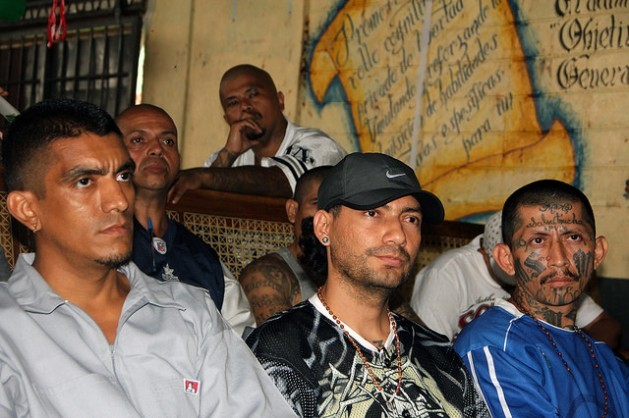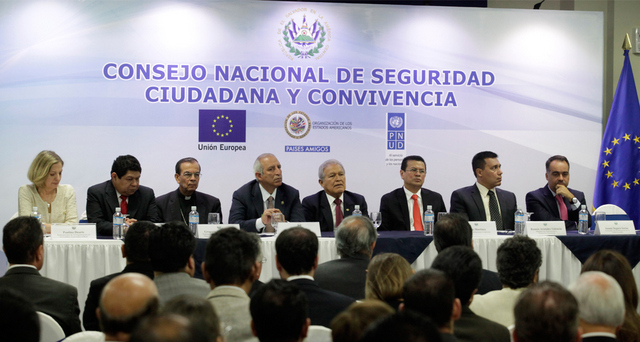Electioneering Undermines Fight Against Crime in El Salvador

SAN SALVADOR, Jan 15 (IPS) - The upcoming municipal and legislative elections in March and the hiring of former New York mayor Rudolph Giuliani as a kind of anti-crime tzar are not the best equation for bringing down El Salvador's high murder rate, analysts say.
Hopes that a national council set up by the government to tackle the problem of soaring crime will bring short-term results are waning because the focus on reducing the homicide rate has been overshadowed by the interest in gaining votes, said experts consulted by IPS.
"I am afraid that they are acting more as a result of the pressure generated by the need to win elections than in response to the country's real need to find a solution to its crime problem," said Raúl Mijango, one of the two mediators of the truce between gangs in place since March 2012.
On Mar. 1, Salvadorans will go to the polls to elect the 84 members of the country's single-chamber legislature, as well as the mayors of its 262 municipalities.
In September, the government of left-wing President Salvador Sánchez Cerén created a National Council on Public Security and Citizen Coexistence, as an innovative response to the soaring crime rates, which have mainly been driven up by the gangs.3
The main gangs, Mara Salvatrucha (MS13) and Barrio 18, have an estimated 60,000 young members in El Salvador's cities.
A total of 3,912 homicides were committed in 2014 in this impoverished Central American country of 6.2 million people – a 57 percent increase from the previous year, after a significant drop in 2012 and 2013 brought about by the truce between gangs.
The surge in the murder rate meant El Salvador returned to its earlier status as one of the world's most violent countries, with 63 homicides per 100,000 population, compared to a global average homicide rate of 6.2 per 100,000 population in 2012, according to the United Nations Office on Drugs and Crime (UNODC).
In March 2012, the main gangs agreed a truce which significantly reduced the number of murders for 15 months. In 2012 the homicide rate fell to 41 per 100,000 inhabitants. But the measure ran up against resistance from a society deeply wounded by the gangs, known here as "maras".
The truce, which in practice has fallen apart, had the backing of the government of former president Mauricio Funes (2009-2014), which saw it as a mechanism to bring down the homicide rate, but never publicly expressed its actual involvement or support. It preferred instead to say it merely helped "facilitate" the agreement, by allowing imprisoned gang leaders to communicate with their deputies outside of prison.
The need for frank analyses of El Salvador's problems and decisions to address them have been undermined by near continuous election campaigns, in a country which goes to the polls to vote every three years or less.
Presidential elections, which are held every five years, took place in 2014, and legislative and municipal elections are held every three years.
On Jan. 5, Sánchez Cerén, a former guerrilla commander during the 1980-1992 civil war, foreclosed any possibility of the gangs participating in any way in the debates in the new National Council on Public Security and Citizen Coexistence.

Mijango told IPS that the position taken by the president and his party, the Farabundo Marti National Liberation Front (FMLN) – a former guerrilla group – to reject any participation by the gangs in the Council is purely motivated by electoral concerns, as the majority of the population is furiously opposed to the gangs, according to opinion polls.
To demonstrate that the new position responds to electoral interests, Mijango pointed out that Sánchez Cerén was vice president under Funes and that the FMLN is the party that "facilitated" the truce.
The National Council is made up of a wide range of academic, religious, citizen, business and international cooperation institutions.
The hope is that with input from the different actors, a consensus will be reached around proposals for tackling the country's violent crime problem.
"In general, the Council is an important platform and will give a boost to national and local programmes and policies," said Jeannette Aguilar, director of the José Simeón Cañas Central American University Public Opinion Institute.
But Aguilar also insinuated in her dialogue with IPS that she had doubts that the National Council would work, given the failure of similar previous attempts to reach a consensus in other areas, such as the economy.
She cited the case of the Economic and Social Council, made up of trade unionists, members of the business community, political parties and civil society organisations, which failed in its aim to hammer out agreements between labour and business.
It is widely recognised that a large part of the country's homicides are the result of turf wars between gangs.
The National Council's Technical Secretariat includes representatives of the United Nations Development Programme, the Organisation of American States and the European Union.
On Jan. 16, the 23rd anniversary of the peace agreement that put an end to 12 years of armed conflict in 1992, the government will announce the first measures arising from the proposals set forth in the National Council.
U.N. Secretary General Ban Ki-moon will be visiting the country at the time to support the government's anti-crime efforts.
The possibility of reaching agreements in this area has also been undermined by the irritation among some segments of society over the presence of former NY mayor Giuliani, who was hired by the National Association of Private Enterprise (ANEP), a powerful business group that also forms part of the National Council.
Giuliani is credited for the major drop in crime in New York City while he was mayor from 1994 to 2001. His team is set to arrive in the Salvadoran capital in the next two weeks.
ANEP is close to the right-wing National Republican Alliance (ARENA), which governed the country from 1989 to 2009, when the FMLN first won the presidency.
The decision to hire Giuliani to make recommendations to the government in the context of the National Council has triggered controversy.
"What Giuliani did in New York is a kind of gringo-style ‘manudurismo' , and in El Salvador we shouldn't be reviving failed initiatives; we need new experiences," Aguilar said.
"Mano dura" is the description of the "zero tolerance" policies against crime adopted by the ARENA governments during their two decades in office, based exclusively on repression. The policies were not successful.
Luis Cardenal, who belongs to one of ANEP's member organisations, told the local media on Jan. 6 that if the government did not accept the proposals set forth by Giuliani and his team, it would be an indication that "it's hiding something," with its National Council initiative.
"ANEP's stance is blackmail, pure and simple," Aguilar said.
For his part, Mijango said the business community plans to use Giuliani to boycott the work of the National Council. With the large media outlets on its side, ANEP will try to ensure that media coverage is only given to the former mayor, in order to delegitimise the work of the National Council and the government, with the aim of hurting the FMLN's performance in the elections.
Edited by Estrella Gutiérrez/Translated by Stephanie Wildes
© Inter Press Service (2015) — All Rights Reserved. Original source: Inter Press Service
 Global Issues
Global Issues